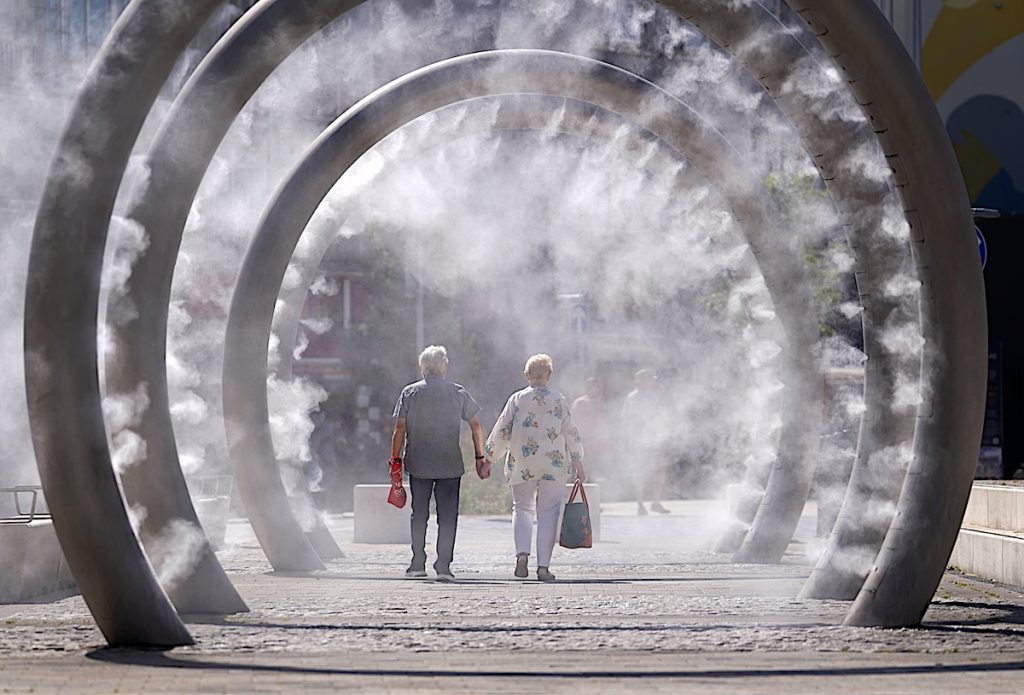
A couple cool off by walking through giant metal rings installed in 2022 to spray mist in Dover, Kent, England as the third heat wave of the summer hits the UK on July 11, 2025. Gareth Fuller / PA Images via Getty Images

Why you can trust us
Founded in 2005 as an Ohio-based environmental newspaper, EcoWatch is a digital platform dedicated to publishing quality, science-based content on environmental issues, causes, and solutions.
Extreme heat, excessive rainfall, ongoing droughts — these conditions are now considered the new normal, according to the latest State of the UK Climate report from the UK Met Office.
The report highlights several alarming trends, including warming at the rate of 0.25°C per decade in the UK. The past three consecutive years have ranked within the top five warmest years ever recorded in the UK, with records dating back to 1884. The past decade, from 2015 to 2024, is reported as 1.24 degrees Celsius warmer than the time period from 1961 to 1990.
“Every year that goes by is another upward step on the warming trajectory our climate is on. Observations show that our climate in the UK is now notably different to what it was just a few decades ago,” Mike Kendon, lead author of the report and Met Office climate scientist, said in a press release.
The #StateOfUKClimate Report shows how the UK’s climate has warmed steadily from 1980s onwards at a rate of approximately 0.25°C per decade
Read the full report 👇
📄 rmets.onlinelibrary.wiley.com/doi/10.1002/…
[image or embed]
— Met Office – weather and climate (@metoffice.gov.uk) July 14, 2025 at 5:51 AM
“This pace of change and clustering of consecutive records is not a natural variation in our climate,” Kendon added. “Numerous studies have shown how human emissions of greenhouse gases are warming the atmosphere and changing the weather we experience on the ground. Our climate in the UK is now different to what it was just a few decades ago, this is clear from our observations.”
Comparing the past decade to the 1961–1990 time period, the Met Office found that the number of days with temperatures at least 5 degrees Celsius higher than the average from 1961–1990 has doubled. The number of days 8 degrees Celsius warmer has tripled, and the number of days over 10 degrees warmer than the former average has quadrupled.

It’s not just summer weather seeing such shifts. October 2023 through March 2024 was the wettest winter half-year on record, accord to the report. Further, six of the 10 wettest winter half-years in England and Wales have happened since the year 2000 (with records dating back to 1767).
With warmer, weather winter weather comes less frost. According to the Met Office, air and ground frosts are down by about 25% compared to frost levels from the 1980s. The sea level is also rising rapidly in response to climate change, with sea levels around the UK up 19.5 centimeters since 1901.
“We are experiencing more severe weather events in the UK due to climate change,” said Stephen Belcher, Met Office chief scientist. “They are a potent reminder of our responsibility to citizens now, and to future generations, to accelerate efforts to adapt our society and infrastructure to cope with these weather extremes. The climate is likely to continue to change, and so we need to prepare for the impacts that will have on the weather we experience on the ground.”
The report relies on an extensive database of observations from weather stations around the UK and historical data. While the latest report focused on climate in the UK during 2024, Met Office warned that some records are being broken yet again so far in 2025.
As the BBC reported, parts of the UK have been declared in an official drought, and last month was England’s warmest June on record. Parts of the UK are facing the third heat wave of the summer, and flooding risks are increasing. The UK National Assessment of Flood Risk, last published in December 2024, determined that one in four properties in England is at risk of flooding by 2050.
“While long-term averages are shifting, it is the extreme heat, intense rainfall and droughts that are having the most immediate and dramatic effects on people and nature,” Liz Bentley, chief executive of the Royal Meteorological Society, said of the State of the UK Climate 2024. “This report is not just a record of change, but a call to action.”

Subscribe to get exclusive updates in our daily newsletter!
By signing up, you agree to the Terms of Use and Privacy Policy, and to receive electronic communications from EcoWatch Media Group, which may include marketing promotions, advertisements and sponsored content.








